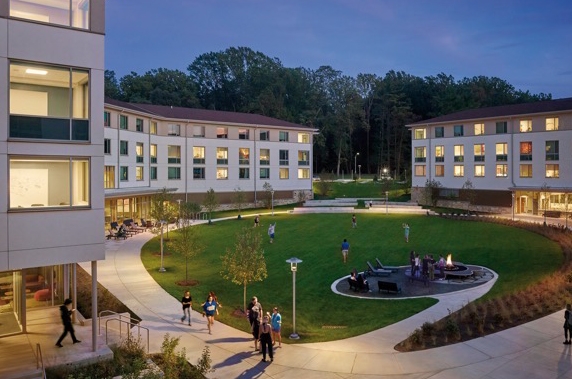More than 30 members of the community attended an Aug. 8 engagement session about Dartmouth’s plan to build apartment-style undergraduate housing on Lyme Road on the north end of campus.
It was the fourth in a series of meetings that Dartmouth is hosting in-person and via Zoom in July and August to get feedback on the North End project. Monday’s session featured a presentation by Interim Dean of the College Scott C. Brown and Associate Dean of Residential Life Michael Wooten on plans to create a vibrant sense of community engagement in the North End residence.
“The goals around this are intellectual engagement, community, and continuity,” said Brown. “We’re thinking very intentionally about crafting the sort of communities we want to build.”
Attendees also heard from Ed Lewis, assistant director of the Dartmouth housing renewal program in Facilities, Operations and Management, and Cooper Melton, associate principal at the design firm Ayers Saint Gross, about how common spaces in the new residences will accommodate studying, health and wellness activities, community gatherings, and other shared activities.
Brown described the planned community as a “developmentally appropriate living option for upper-class students,” noting that in a typical year approximately 10% of undergraduates already opt to live off-campus, a number that has only increased since the beginning of the COVID-19 pandemic.
The new facility will be fully integrated into the College’s house community system, which provides a home base for students throughout their Dartmouth experience.
Melton explained how his team is building “cascading scales of community” into the design, balancing private apartment-like units with common spaces—indoors and out—that encourage social engagement.
The presenters shared preliminary feedback from student and faculty focus groups conducted over the past two months. Scott said that focus-group students especially like the sustainability features of the plans and are concerned about transportation and dining options. (Sustainability and transportation were the topics of the meeting held on Aug. 1.) Ideas from the focus groups and from the community meetings will help inform the next iteration of the project plans.
Several alumni participants praised the details of the project’s design and its programming goals but questioned how its distance from campus might impact the student experience. Several wondered if the planned residence would be better suited to graduate students instead of undergraduates.
Lewis noted that a short-term goal of the project is to provide more space for undergraduates while Dartmouth renovates existing residence halls over the next 12 to 15 years. Longer term, the flexible design of the facility will allow it to be converted to graduate student housing, depending on the institution’s needs at that time.
David Millman ’23 encouraged planners to host additional community discussions during the fall term to enable more student participation.
The fifth and final community session in the series, addressing residential building design and materials, will be held at 6 p.m. on Monday, Aug. 15. For information and to register, visit the North End Housing website. Comments and questions are welcome at Dartmouth.North.End@dartmouth.edu.
